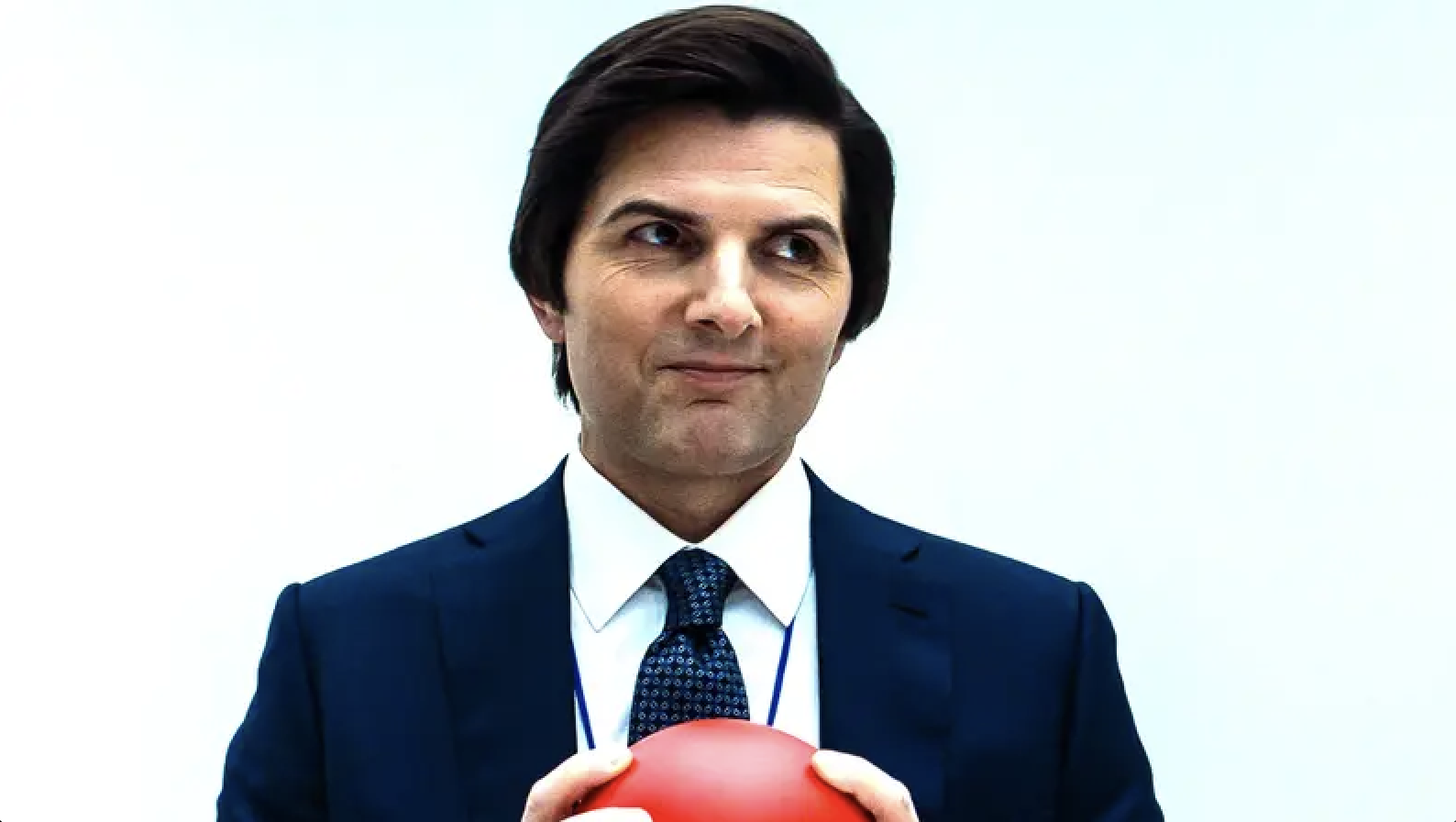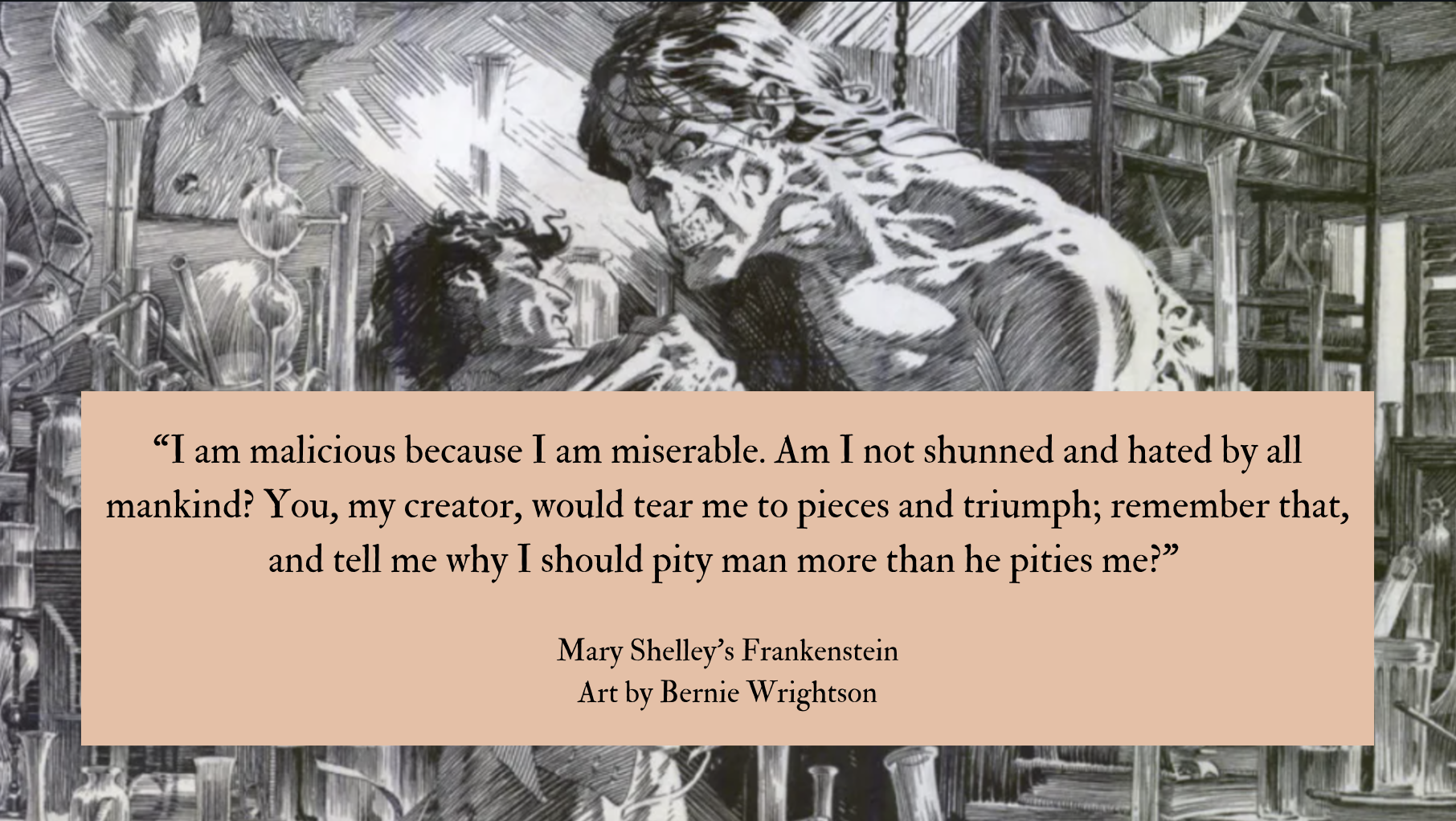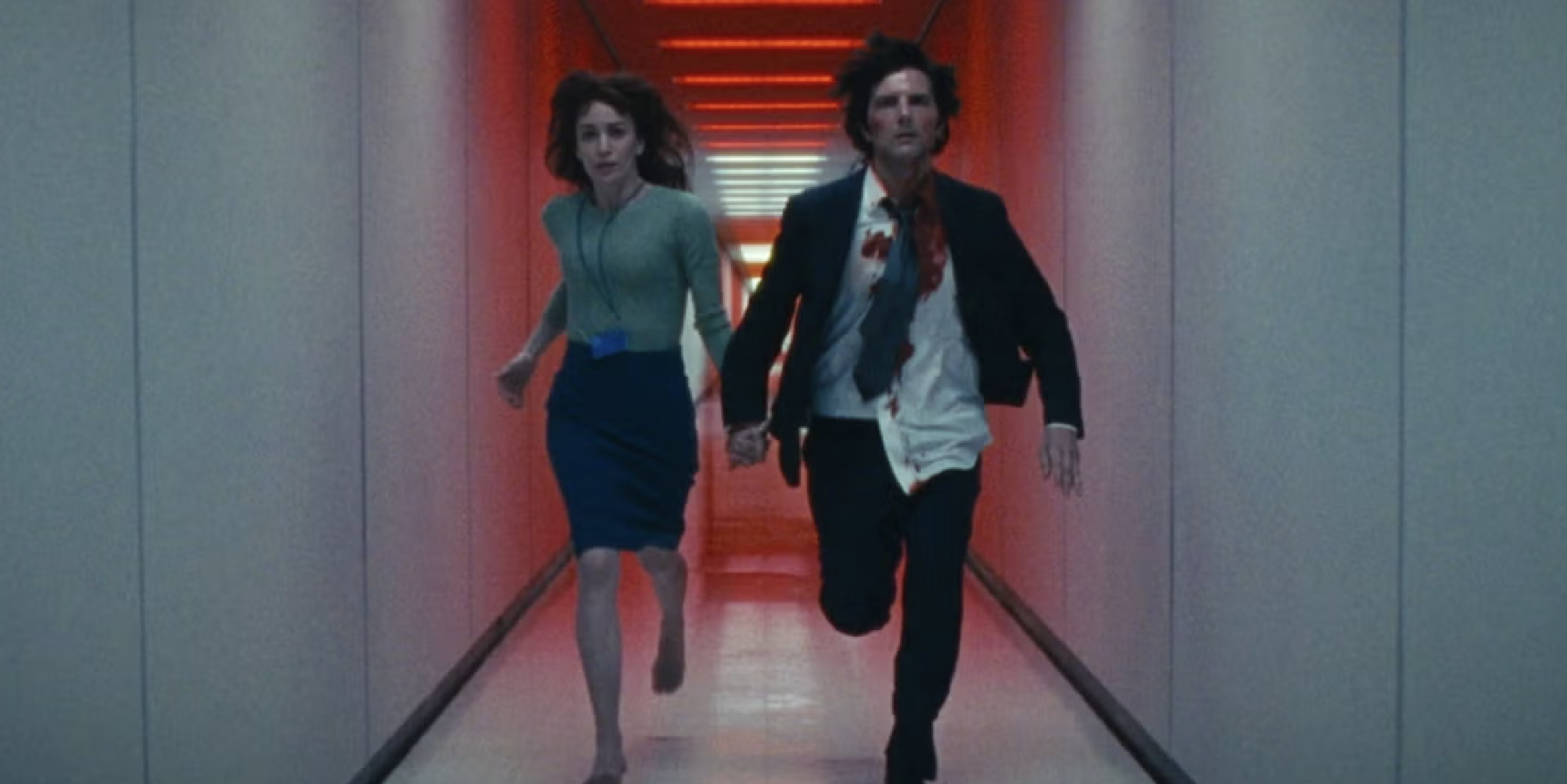Mark Scout's Monster: On the Severance Season 2 Finale and Mary Shelley’s Frankenstein
Warning: Contains spoilers for seasons one and two of Severance, up to and including the season two finale.
I, like every other corporate-hating nerd who also still has an ethically-disastrous reliance on Apple technology, have been watching Severance. I got in on the ground floor of this one, and have been watching weekly since the beginning of season 1. It's a show that lights up all my synapses. Not because I respond particularly well to a mystery box, and not just because it's one of the most beautifully shot and art directed shows I've seen on television, but because I'm an absolute sucker for well-written stories in which good-hearted characters do their best in impossible situations. On that front, Severance has delivered deliciously.
The nature of Severance is that it is a show divided by time and place. After losing his wife Gemma to a car accident, one of our dual protagonists, Mark Scout, has signed up for the wildly experimental and ethically dubious "severance" program at super-cult/corporation Lumon. This creates our second protagonist, Mark S (both played by Adam Scott). The Marks are a divided consciousness sharing a single body in the supposed pursuit of work-life balance. Mark Scout, the "outie", has control of his body during all out of work hours. His consciousness contains all memories of his life up until the moment of severance, at which point he loses whatever happens on the severed floor of the Lumon building. Those belong entirely to Mark S.
Mark S is less than two years old, and lives a bizarre, contextless existence in a fluorescent subterranean labyrinth. He has no memories in common with Mark Scout, and has only a nebulous sort of knowledge of the world. He has never seen anything outside of the floor. He has never (until the ORTBO episode) experienced natural daylight. He has never slept. He is the direct product of Mark Scout's debilitating grief and loneliness, and yet he is inherently a sweet creature. Kind, optimistic, a little awkward. He is, as we eventually learn of all the innies, a sort of pure, child-like version of his outie: the thems they were before all the complexities of life shaped them into something different.
By the very nature of the concept, direct communication between our two protagonists (or, indeed, any innie-outie combo) is nigh-on impossible. Lumon forbids it in-world except for in very specific circumstances, and takes great steps to stop it from ever happening without their direct mediation. In this way, although they separately begin trying much earlier on (Mark S in Season 1, Mark Scout in Season 2), Severance is able to hold off on the Marks holding a conversation until the finale episode of Season 2.
This conversation, which we've been waiting for for over THREE YEARS (because we live in a bizarro world where TV shows don't get made on anything even resembling a schedule anymore), goes spectacularly badly. And I think it's one of my favourite sequences in the show, because for me, this is the sequence where Mark S grows up. Or, to be more specific, where he has that last shred of childlike hope and optimism torn out of him.
It's also where I did a Leo point at the screen and yelled "FRANKENSTEIN."
In Season 1, we see Mark S's love interest and series baddie (complimentary) Helly R receive direct communication from her outie after a thwarted series of resignation attempts ends in an attempted suicide/murder. In this video, played to the entire Macrodata Refinement team (which Mark S is technically sort of in charge of), Helly's outtie tells her in no uncertain terms that she is not in control of their life. To Helly's outtie, and, indeed, for all legal purposes, she is not a person. She does not have rights.
Mark S sees this and feels enormous sympathy, but doesn't seem to consider for a single hot second that his outtie could share the same viewpoint. So when Mark S's eyes are opened to the fact that he and the other severed workers are being wildly mistreated, he assumes his outtie will help him. Season 1 climaxes with a plan for the innies to have their consciousnesses switched out-of -hours, find someone close to their outties to explain everything to, and trust their outties and loved ones to take care of the rest. It's an optimistic plan hatched by sweet and trusting minds.
In Mark S's case, it more or less goes as intended, and he shares the innie's plight to Mark Scout's cool sister Devon. But what also happens is that, upon seeing a picture of Mark Scout's dead wife, we and Mark S realise that she is, in fact, still alive and was, until recently, working on the severed floor as wellness officer "Miss Casey." Mark S manages to shriek this to a room full of people before he is forcibly switched back. This moment is the HOLY SHIT OMG WHAT A TWIST!!! cliffhanger of the entire season (I was, to be clear, screaming), and the quest to find Gemma/Miss Casey and get her out of the Lumon building takes precedence for both Mark Scout and (to a lesser extent) Mark S in season 2. It's the entire reason Mark Scout (with a lot of help from his sister and a pissed-off former Lumon employee they've roped into an alliance) makes contact with Mark S for their ill-fated conversation.
The blame doesn't only rest on Mark Scout here. Mark's sister and fan-favourite Devon, in whom Mark S put all of his trust to help him out, fails him first. She (as far as he's aware) yoinks him out of the severed floor to face his terrifying old boss (instigator of all that wild mistreatment), and asks if he remembers the last thing he said to her: "She's alive." In the time since Mark S has confided in Devon, things have only gotten worse for him at Lumon. He has been lied to, manipulated, and sexually assaulted by Helly's outie. One of his co-workers has, for all intents and purposes, been murdered for insubordination. But Devon doesn't ask about how all of that's going. She's an ally to the innies, sure, but it's all ideological to her, and she has a far more pressing issue: she might be able to get her dead friend back. She might be able to make her brother happy again. Mark S's problems can wait, surely, until that happens.
So that's the greeting Mark S receives before being handed a camcorder and left alone. It's not a great start, but he's nervously excited to play the video and meet, for the first time ever, his outie. The guy who created him, and who must have his back.
What he gets is a set of instructions and unpadded, fairly confronting news. Mark Scout explains to Mark S that they have a plan to get Gemma/Miss Casey out of Lumon. All Mark S has to do is risk his life getting to the super secret part of the severed floor, and then escort her back through said floor to the fire exit. Oh, and doing this will probably--hopefully!--bring down Lumon and end the severed program. Not to worry, though! Mark Scout has been undergoing a process that will subsume Mark S back into his consciousness, so he won't die, per se, but everyone he loves will. Including Helly, who Mark Scout is very much not down to pursue any kind of relationship with anyway. But, hey! He's so psyched his innie got to experience a little crush!
Mark S, Mark Scout tells him -- in far more, and friendlier, words than Helly's outtie -- is not a person. He is not, and will not, be in control of their life. He does not have rights. Mark S hears this loud and clear, and he calls bullshit.
Reader, I was screaming.
In Mary Shelley's seminal science fiction work Frankenstein, the titular Dr. Victor Frankenstein thwarts god and nature by creating new life via a patchwork of stolen corpse bits and experimental technology. Unlike Mark Scout, Frankenstein is motivated not by grief or loneliness, but an ambition that goes beyond hubris. Where they overlap is the absolute lack of thought either of them put into the ramifications of creating a new life form. Frankenstein, like Mark Scout, feels no love, affection, or even responsibility for his creature. He abandons it completely, leaving it to make sense of the world alone, and when it returns to negotiate with its creator, it is refused, mocked, and reviled. Despite all evidence that Frankenstein's creature is capable of highly intelligent thought and deep feeling, Victor Frankenstein refuses to acknowledge it as a person. He utterly denies its (actually fairly reasonable) request for a mate so that it can enjoy company that won't scream their head off when they see its corpsey visage (not its fault!). It is in this moment that Frankenstein truly creates his monster. Not at its birth, not even at his first act of cruelty towards it, but in this final refusal to allow it even a semblance of personhood or happiness.
"He's a child," Mark Scout exclaims when Mark S refuses to let him take the lead, demanding instead to know that all the innocent people on the severed floor won't be sacrificed so that one version of Miss Casey can live. But he's not a child. Not anymore. He has valid questions, and now he knows that he and the other innies are truly alone in the world. Even those sympathetic to them see them as less than the consciousnesses that created them. Even their allies see their deaths as an acceptable outcome.
Frankenstein's monster murders Frankenstein's wife. He does this to punish his creator, to force him to share in the lonely misery the monster has been condemned to.
Mark S saves Mark Scout's wife, but he refuses to follow her out of the building. He denies Mark Scout his chance to be with Gemma after so long apart, turning away from the fire escape door to prioritise his own life, his own love.
We end Season 2 with Mark S fleeing into the labyrinth of the severance floor with no destination in mind and, it seems, no clear intention of ever ceding his shared body again. Mark S doesn't have to kill his creator in order to find a sense of release. He only has to keep existing. And I, for one, am so intrigued to see where we go from here.
Some other thoughts about the finale and/or Frankenstein that I couldn’t find a home for in the above essay:
I absolutely love that, of the communication we've seen between innies and their outies so far in the show, Dylan is one to validates his innie and show him a modicum of respect. I love the entire MDR team, but Dylan (played by Zach Cherry, who also has my whole heart over on Amazon’s Fallout) continues to be an absolute delight, and his story this season was really lovely. Extra props to whoever thought to cast Merritt Wever as his outie’s wife, who always brings such a gorgeous, grounded energy to everything.
Mark S gets the absolute snot beaten out of him in the attempt to save Gemma/Miss Casey, to the point where he is very nearly murdered in cold blood by an unsevered Lumon employee. And who saves his life? Another innie (played by the wonderful and well-used Gwendolyn Christie). Naturally.
Mary Shelley was on the periphery of a great deal of the Luddite movement (in which the textile workers of the early 1800's sought to dissuade the early industrialists from replacing them with machines and lower paid, unskilled workers by use of very large hammers), and Frankenstein can quite easily be read as a Luddite text. The Luddites (and Frankenstein) didn't argue against technological advancements in and of themselves, but against the unethical use of them, and the lack of thought or care for the people being displaced and exploited as a result. This is a core tenant of a great deal of science fiction and speculative fiction in general (Mary Shelley is, in all cool circles, seen as the mother of science fiction) but makes it a particularly good pairing with Severance.
Helly and Gemma got fairly sidelined in this essay, but please trust that I am a huge fan of both characters, and I fully understand (and sympathise with) the Marks conundrum. I feel like the answer is very obviously a body-sharing throuple, but we’ll see where they go with it.
Please note that I am not actually scolding Devon or Mark Scout for their actions, I find them both incredibly compelling as characters. Characters should fuck up! Royally! Often! That's where the humanity and the drama comes from.
I really love this show.
This essay was first posted on Patreon on March 23, 2025.




